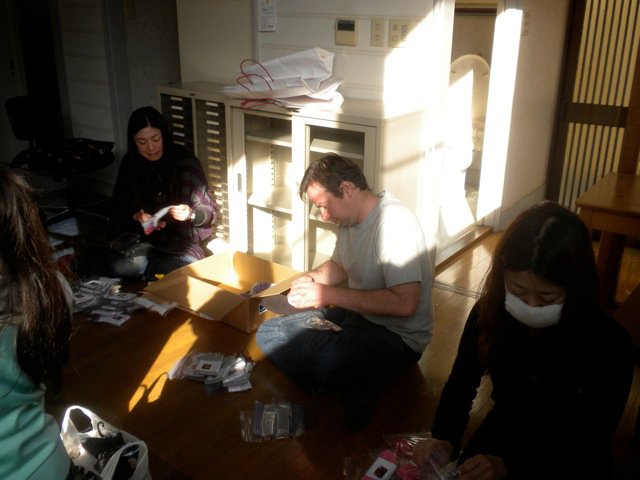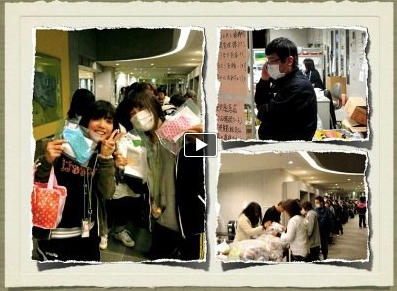Jason Kelly – Socks For Japan
How Citizens Can Help Survivors
by Jason Kelly
 On March 11, 2011, one of the largest earthquakes ever to hit Japan sent a tsunami deep into cities and towns along the coast of Tohoku, the northeastern region of Honshu, the country’s largest island. The wave killed 16,000 people and destroyed or damaged more than a million buildings.
On March 11, 2011, one of the largest earthquakes ever to hit Japan sent a tsunami deep into cities and towns along the coast of Tohoku, the northeastern region of Honshu, the country’s largest island. The wave killed 16,000 people and destroyed or damaged more than a million buildings.
I’m an American living an hour north of Tokyo in a city called Sano, and that quake is still in my bones. It sounded like wind approaching underground. The power went out and none of us knew until the next day the devastation that lay farther north. When we saw it on the news and recognized places we’d been, we had to help.
Helping after a natural disaster is not easy, however. Most relief organizations advise staying out of the way and just donating money. Those who’ve been in disaster zones around the world tell stories of people dumping piles of unsorted junk that nobody wants to pick through. Kindhearted supporters helping the wrong way like this make the situation worse, not better. Yet, there is a way for citizens to help directly by bringing gifts beyond the life support provided by governmental and non-governmental organizations. Small groups of volunteers can comfort survivors personally and give them hope.
Large relief operations necessarily focus on food, shelter, and medical care, and they’re good at it. In Japan, the military set up camps at breakneck speed. The Japanese Red Cross deployed thousands of doctors and nurses. Gymnasiums and other public spaces became shelters. After this phase, though, survivors ended up on mats on giant floors, surrounded by strangers, fed three times a day, checked off as having been looked after. Two days went by, then four, then a week, and still the survivors sat with only thoughts of their homes washed away, their jobs gone, their cars missing and, most of all, the people they’d never see again. Depression became the sharpest thorn in a survivor’s side.
 To help, we started Socks for Japan to deliver socks with care letters from people around the world. We learned from reports of past disasters that people in shelters often request socks, and they were a perfect item for our volunteer group to manage. Socks are cheap, they don’t break or spoil, and everybody needs them. We focused on this simple care package, sorted into five categories for men, women, boys, girls, and babies. We would not create chaos by collecting many different kinds of clothing or other items. We checked with Japan’s postal service and shipping companies to be sure we wouldn’t cause trouble by receiving thousands of boxes of socks. They assured us that we would not.
To help, we started Socks for Japan to deliver socks with care letters from people around the world. We learned from reports of past disasters that people in shelters often request socks, and they were a perfect item for our volunteer group to manage. Socks are cheap, they don’t break or spoil, and everybody needs them. We focused on this simple care package, sorted into five categories for men, women, boys, girls, and babies. We would not create chaos by collecting many different kinds of clothing or other items. We checked with Japan’s postal service and shipping companies to be sure we wouldn’t cause trouble by receiving thousands of boxes of socks. They assured us that we would not.
We announced our project to the world, and the world stepped up. Those thousands of boxes arrived from the United States, Australia, Canada, and dozens of other nations including Malaysia, Singapore, the United Kingdom, Peru, Qatar, Croatia, French Guiana, and Finland. Some boxes burst open to reveal 50 pairs of socks with colorful notes from children. One pair arrived alone in an envelope. The letters of encouragement helped our volunteers as much as they did survivors. In a time of sadness and fear, it boosted my spirit to hold boxes from home. Return labels from churches, Brownie troops, neighborhood coffee shops, small town light and power departments, Mrs. Wilson’s fourth grade class, and other mainstays of American culture poured in. Over 70 percent of donations came from the United States. I was so proud of my country.
Forty local volunteers sorted this precious cargo each night after work and on weekends, helped by 20 volunteers from overseas. We made two trips per week 200 miles north into the heart of the disaster zone, visiting shelter after shelter to hand-deliver each package. Community leaders heard about us and requested visits to their neediest people. We became experts at packing our gifts, 100 pairs and letters per clear storage bag, and knew how many thousands we could take in our van.
 The result was smooth distribution of a basic item that people needed, with a letter that brightened their day. Survivors held our hands while telling their stories. They’d cry and say how badly they needed socks. Sometimes, they’d hold up a letter proudly to announce, “This came all the way from America!” We weren’t saving lives, but we were improving them.
The result was smooth distribution of a basic item that people needed, with a letter that brightened their day. Survivors held our hands while telling their stories. They’d cry and say how badly they needed socks. Sometimes, they’d hold up a letter proudly to announce, “This came all the way from America!” We weren’t saving lives, but we were improving them.
In 35 trips, we delivered 160,000 pairs of socks with letters. Some went to big cities like Ishinomaki, where people lined up in front of Watanoha train station by the hundreds and waited patiently to receive a gift from our van. One time there, we ran out of socks before reaching the end of the line and worried for a moment that a riot would ensue. Instead, the next person after the last person to receive socks told us, “We understand. Just please come again.” We did, on our very next trip. Other socks went to fishing villages at the ends of roads scraped through tsunami mud, where our volunteers walked to old ladies on mats who lifted their heads to see who’d come for a visit. None of us will forget the transition of their faces from expressionless resolve to delight. “For me?” they’d ask. “You brought these for me?”
Some of the survivors wrote back to their donors, and friendships formed. Charmingly rough English made the letters more touching. One read, “Received a warm socks. I get happy tears. Japan still must work hard. Going to overcome the hardships together. Thank you very much.”
Citizen volunteer groups can help survivors by delivering the care of the world directly where it’s needed most. When they focus on one needed item and bundle it with love, they reach people in ways that large organizations do not. Creating in somebody the idea that their survival was a blessing, that they will find happiness again, is important. Basic necessities keep people alive, but compassion provides the joy of being alive.
Jason Kelly is a financial writer based in Sano, Japan. Socks for Japan trip reports and photos are permanently posted at socksforjapan.com.
Click the image below to view Jason Kelly’s speech about Socks for Japan:




